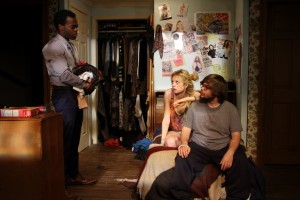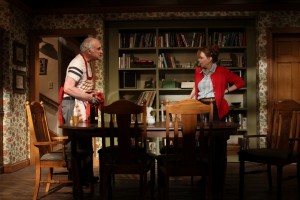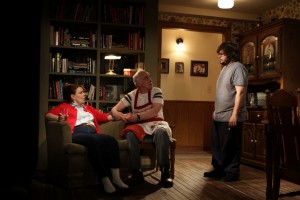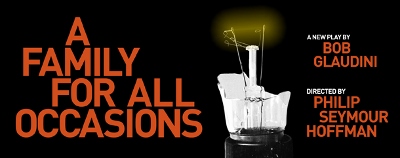WHAT MAKES A FAMILY
What makes a family? What keeps one together? And what do you do when you’re stuck in one that doesn’t fit in with how you want yourself or your life to be? These are the questions Bob Glaudini appears to be trying to answer with his slice-of-life drama A Family for All Occasions, in which the family at issue deteriorates, grows, falls apart, and re-forms. Philip Seymour Hoffman’s keen direction and the actors’ sympathetic characterizations make organic and compelling theater from Mr. Glaudini’s new play, which, although radiating spiritual earnestness and boasting well-defined characters, relevant themes, sharp dialogue, and warm humor, moves too slowly in the first act and too quickly in the second; it frequently feels dramatically passive, and doesn’t offer quite enough insight into its subject matter.
 The always excellent Jeffrey Demunn delivers a grounded and balanced performance as Howard, a retired electrician who fixes cheap lamps to supplement his meager pension. Though full of love and compassion, Howard is timid in the extreme, afraid of his wife and powerless to stop his two children from walking all over him. He is also incapable of helping them with what they need: His daughter Sue (Justine Lupe), a desperate party-girl in her early twenties whose only pleasures are alcohol, drugs, and sex, seems unhappy and headed for a crash, but nothing Howard says or does can alter her trajectory.
The always excellent Jeffrey Demunn delivers a grounded and balanced performance as Howard, a retired electrician who fixes cheap lamps to supplement his meager pension. Though full of love and compassion, Howard is timid in the extreme, afraid of his wife and powerless to stop his two children from walking all over him. He is also incapable of helping them with what they need: His daughter Sue (Justine Lupe), a desperate party-girl in her early twenties whose only pleasures are alcohol, drugs, and sex, seems unhappy and headed for a crash, but nothing Howard says or does can alter her trajectory.
 His teenage son Sam (Charlie Saxton), a sarcastic, anti-social chubster, who spends most of his time in his room on his outdated computer trying to create a video game that he claims will earn him a full scholarship to MIT, finds his father’s advice defeatist and useless, and what he tells his father he really needs – a new computer – his father cannot afford. Howard likewise cannot afford to save his wife from her menial, backbreaking job, as she is the household’s sole breadwinner. But then Oz (William Jackson Harper) enters the picture. A capable and strong-willed young man who Sue met in a bar, Oz appears at first to be a perfect fit, holding the solutions to many of this family’s problems.
His teenage son Sam (Charlie Saxton), a sarcastic, anti-social chubster, who spends most of his time in his room on his outdated computer trying to create a video game that he claims will earn him a full scholarship to MIT, finds his father’s advice defeatist and useless, and what he tells his father he really needs – a new computer – his father cannot afford. Howard likewise cannot afford to save his wife from her menial, backbreaking job, as she is the household’s sole breadwinner. But then Oz (William Jackson Harper) enters the picture. A capable and strong-willed young man who Sue met in a bar, Oz appears at first to be a perfect fit, holding the solutions to many of this family’s problems.
 The first act of Mr. Glaudini’s play takes place over the course of a day, and although Mr. Hoffman’s direction breathes rich life into every beat, not enough happens on David Meyer’s realistic set, which is subtly lit by Japhy Weideman. It seems to be the playwright’s intention to show us these characters in their world and to let the story meander, which only partially works. Coming in we know girls like Sue, we know boys like Sam, and almost immediately we get a good sense of this family; we’ve seen them in life, and it’s admirable how nicely Mr. Glaudini illustrates their personalities. But he needs for them to do more, to fight for what they need, in order to give his picture a sense of depth. Perhaps his point is that their passivity is their action, which is how it often seems with these kinds of people in real life. But this is drama, where the author’s job is to pick out the important, telling moments in a character’s life. Also, real life is boring, that’s why we go to the theater.
The first act of Mr. Glaudini’s play takes place over the course of a day, and although Mr. Hoffman’s direction breathes rich life into every beat, not enough happens on David Meyer’s realistic set, which is subtly lit by Japhy Weideman. It seems to be the playwright’s intention to show us these characters in their world and to let the story meander, which only partially works. Coming in we know girls like Sue, we know boys like Sam, and almost immediately we get a good sense of this family; we’ve seen them in life, and it’s admirable how nicely Mr. Glaudini illustrates their personalities. But he needs for them to do more, to fight for what they need, in order to give his picture a sense of depth. Perhaps his point is that their passivity is their action, which is how it often seems with these kinds of people in real life. But this is drama, where the author’s job is to pick out the important, telling moments in a character’s life. Also, real life is boring, that’s why we go to the theater.
 The second act of A Family covers about a year, and here the script is crammed with events. Unfortunately, rather than evolve they mostly just happen, like statements. We seldom get to see the interesting parts of the stories, moments that should, ostensibly, give us meaningful insights into these characters and into (one hopes) the world we live in. This lack of progression, perhaps even focus, makes the climax seem jarring and a tad shallow. Fortunately this doesn’t take away from the play’s conclusion, which is quite moving and brings a good measure of satisfaction.
The second act of A Family covers about a year, and here the script is crammed with events. Unfortunately, rather than evolve they mostly just happen, like statements. We seldom get to see the interesting parts of the stories, moments that should, ostensibly, give us meaningful insights into these characters and into (one hopes) the world we live in. This lack of progression, perhaps even focus, makes the climax seem jarring and a tad shallow. Fortunately this doesn’t take away from the play’s conclusion, which is quite moving and brings a good measure of satisfaction.
photos by Carter Smith
A Family for All Occasions
Labyrinth Theater Company at Bank Street Theater
scheduled to end on May 26, 2013
for tickets, call 212.513.1080 or visit http://labtheater.org/
